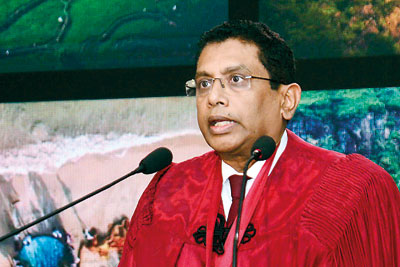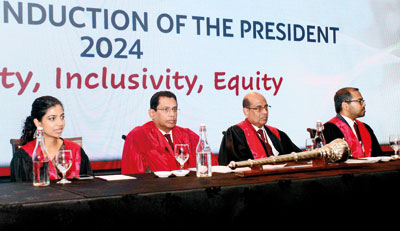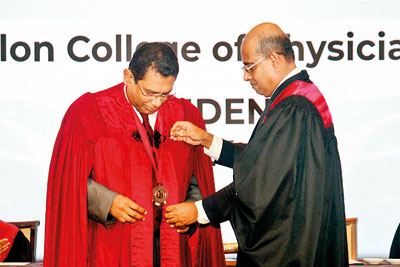News
A passionate pledge to ensure inclusivity and equity in diverse Sri Lanka
View(s):- Dr. Upul Dissanayake takes over as the 48th President of CCP
By Kumudini Hettiarachchi

The newly-inducted CCP President, Dr. Upul Dissanayake, delivering his plan of action for the year. Pix by Eshan Fernando
As he takes over the captaincy of an august group of healers scattered across the far corners of this country, it is not only his medical knowledge but also his vast experience and humanity which will play a pivotal role in all that he does.
Aptly, as Consultant Physician Dr. Upul Dissanayake was ceremonially inducted as the 48th President of the Ceylon College of Physicians (CCP) – which had as its first leader, the revered Dr. E.M. Wijerama back in 1967 – on Friday (January 19), his theme is powerful and poignant, resonating the needs of Sri Lanka.
‘Diversity, Inclusivity and Equity’ is his theme and this is what Dr. Dissanayake would strive to achieve along with his efficient Council including his able and straight-talking lieutenants, Joint Secretaries Dr. Chiranthi Liyanage and Dr. Chanaka Aberathne.
The tone is set by Dr. Dissanayake from his first words as he greets the audience with: “Ayubowan, Wanakkam, Assalamu Alaikum and Good Evening.” Incidentally, this was the Physician back in 2018, who spearheaded a campaign by a powerful group of medical specialists to debunk the wanda pethi (infertility pills) falsehoods and rumours.

The head-table (from left): CCP Joint Secretary Dr. Chiranthi Liyanage; newly-inducted President Dr. Upul Dissanayake; Outgoing President Dr. Duminda Munidasa; and Joint Secretary Dr. Chanaka Aberathne
Why this theme, is crystal clear, for even though Dr. Dissanayake has been attached to the premier National Hospital of Sri Lanka (NHSL) since 2017, his journeys across the country are proof of his wide experience of feeling the pulse of the people.
Back in 2004, Mahiyanganaya (when he took a bus to this town, sometimes standing during the full journey of about six hours and then walking about two kms to the hospital early morn as there were no trishaws in those days) was his first posting as an acting Physician. Before his appointment, this station had been under a District Medical Officer (DMO) and 20 years ago he could only order tests to get a differential count for WBC (white blood cells) and also UFR (urine full report) twice a week.

Dr. Upul Dissanayake (left) taking the oath as the new CCP President, while Outgoing President Dr. Duminda Munidasa looks on
The criss-crossings across the country seem like an adventure but it has strengthened his humanity and made him realize that “conformity” is also a synonym for “monotony”. To Badulla [where an elderly couple had told him that they sold their padikkama (spittoon) to access private consultation], Horana and Chilaw he had gone as an acting Physician, with the first appointment as Physician being to Embilipitiya, then Kuliyapitiya, Kalutara, Panadura and finally Colombo.
“We are a diverse country in every way – ethnically and culturally and also with regard to language, religion, sexual-orientation and ability-disability,” says Dr. Dissanayake, digressing to tell us how when he entered the Medical Faculty in Colombo from Kurunegala’s Maliyadeva College, he could understand English but not speak it. So he followed a Diploma Course at Aquinas College to meet this lack.

Dr. Upul Dissanayake being awarded the medal by Dr. Duminda Munidasa
He then recreates a routine ward-round – the House Officer presents the “case” to the Specialist and there follows a discussion on what the illness could be and what investigations needed to be done……..all the while, the “patient” not the “case” lies in bed not understanding a word being said because according to the Department of Census and Statistics in 2012, literacy in English was around 24% among those over 10 years of age.
While the patient is clueless, wondering what is making him/her ill, when would he/she be getting better and when he/she would be able to go home, we move onto the next patient, says this Physician. The patient is not just considered a subject but a “mere object”.
Picking up the ‘Diagnosis Card’, he says that everything there too is in English, except the sayanaya (clinic) date which is in Indo-Arabic numerals which the patient can fathom.
“I am not ashamed to say that I cannot speak Tamil and this makes all of us less sensitive to the needs of patients. Around 28% of our population comprises Tamil speakers but only about 6% of the Sinhalese speak Tamil and 33% of Tamils speak Sinhala. This is why diversity is futile if there is no inclusivity and equity,” stresses Dr. Dissanayake.
Pointing out that he is not a proponent for medical education in the vernacular, he says that it should be in English because there is a need for global communication and keeping updated with the latest development. There should, however, be Sinhala and Tamil Language courses both at medical school and post-graduate level to better equip the doctors. During their 2½ years, Sinhalese post-graduate trainees should be sent to linguistically different locations in Jaffna or Batticaloa for a six-month attachment and Tamil trainees to Colombo, Galle or Kandy, so that they would then be rounded off in those languages.
He questions how doctors cater to those who cannot see (in the 2012 Census there were around 1 million) and who cannot hear (close to 390,000). “We talk to the person accompanying the patient as if the patient is a mere object,” he says, looking at the realities of the health sector.

The CCP Council for 2024
Appreciating the initiative of the Health Ministry and the National Medicines Regulatory Authority (NMRA) that all labels of medicines should be in English, Sinhala and Tamil, he suggests that Braille too should be included.
He also seeks the support of colleagues with regard to unlabelled drugs dished out at private dispensaries, requesting labelling of such drugs as it is the basic right of patients to know what they are taking and would help educate and empower them.
Another point of contention for this Physician is that even though our population consists of 52% women, the country has failed to provide equitable healthcare to them. The hospitals do not provide them with adequate privacy.
Referring to being culturally sensitive, he says it is the duty of doctors to realize that some groups and communities may be victims to false beliefs and misinformation on vaccines and medications. Cultural sensitivity is also essential to accommodate certain women’s groups who are reluctant to seek help from male doctors. Otherwise, there would be no inclusive and equitable care.
On the religious aspect, he points out that while hospitals have shrines for some, such as Buddhist temples and bo trees, Christian churches and in some areas kovils to cater to the psychological and spiritual wellbeing of patients, some others in a minority have been left out.
Next, Dr. Dissanayake turns his focus to the LGBTQ [lesbian, gay, bisexual, transgender and questioning (or queer)] community, quoting data which indicate that in Sri Lanka they comprise about 12% of the population, even though they are “hidden” due to stigma.
Lamenting that their problems with regard to differences, illness and welfare have not been solved, he points out how they are marginalized, leaving them in the shadows, even by healthcare staff including doctors.
The world has moved on, he says, with Britain changing its archaic laws which discriminated against the LGBTQ community, while in France history has been made by Gabriel Attal, an openly gay man, being named the new Prime Minister. However, in Sri Lanka, we cling to archaic Victorian puritanical thinking and still dub homosexuality a criminal offence. A report on the human rights violations against the LGBTQ community from August 2021 to March 2023, indicates that nearly 41% of the perpetrators were police officers and around 27% were healthcare staff. It is an example where “supposed protectors” have become “violators”.
He dips into history and says that according to the Mahavamsa when poet Kalidasa died, King Kumaradasa committed suicide, giving a hint of a homosexual relationship.
Moving to the present, Dr. Dissanayake queries as to what has happened to a bill to decriminalize homosexuality presented to Parliament which was ruled by the Supreme Court as not violating the Constitution.
With emotion, he recalls the plight of those afflicted by HIV and Hepatitis B who are “less” welcome in healthcare centres – a person with a bad cut in the arm who had disclosed that he was Hepatitis B positive had been sent from pillar to post by three private healthcare institutions. Isn’t this social injustice?
Dr. Dissanayake’s clarion call is: “The CCP will recognise the diversity of Sri Lanka and fight for inclusivity to preserve equity.”
The best way to say that you found the home of your dreams is by finding it on Hitad.lk. We have listings for apartments for sale or rent in Sri Lanka, no matter what locale you're looking for! Whether you live in Colombo, Galle, Kandy, Matara, Jaffna and more - we've got them all!

